
Image: Nanotechnology
Do your old, damp coffee grounds have the potential to save the world? New research from the journal Nanotechnology states that the same coffee grounds you toss in the trash every day actually have the ability to store methane.
ECS Fellow Meyya Meyyappan and a team of researchers found that by combining the used coffee grounds with potassium hydroxide, a material with the ability to store substantial amounts of methane was created.
Coffee Grounds Fight Climate Change
In light of global warming and the damaging effects rising temperatures and increased greenhouse gas emissions have on the planet, the ability to store harmful methane is critical.
Methane is a preventable greenhouse gas that accounts for about 10 percent of all harmful emissions derived from human activity. While methane doesn’t stay in the atmosphere as long as the more commonly talked about carbon dioxide, it is far more devastating to the climate due to its extreme efficiency in absorbing heat. In fact, methane is about 84 times more potent than carbon dioxide.
If these greenhouse gases keep building at the rate they currently are, they will continue to create a thicker atmospheric blanket, which will trap the sun’s heat at a dangerously high level. This could lead to rising sea levels, warming oceans, and shrinking ice sheets.
Trapping Emissions
The researchers behind this new discovery hope that this information can help control methane levels and help slow down the process of global warming.
This from Popular Science:
Researchers have been looking at ways to store methane for quite some time. With this new method, the treated coffee grounds can store up to seven percent of their weight in methane. As an added bonus, the storage is also stable at room temperature, between 58 and 94 degrees Fahrenheit (288 to 308 Kelvin).
Those involved believe this discovery could yield big potential outcomes. From developing devices to store methane to the beginnings to next-gen fuel cells to powering green cars—coffee grounds certainly have much more potential than just sitting stale in your coffee maker.
PS: Check out more research by ECS’s Mayya Meyyappan!


